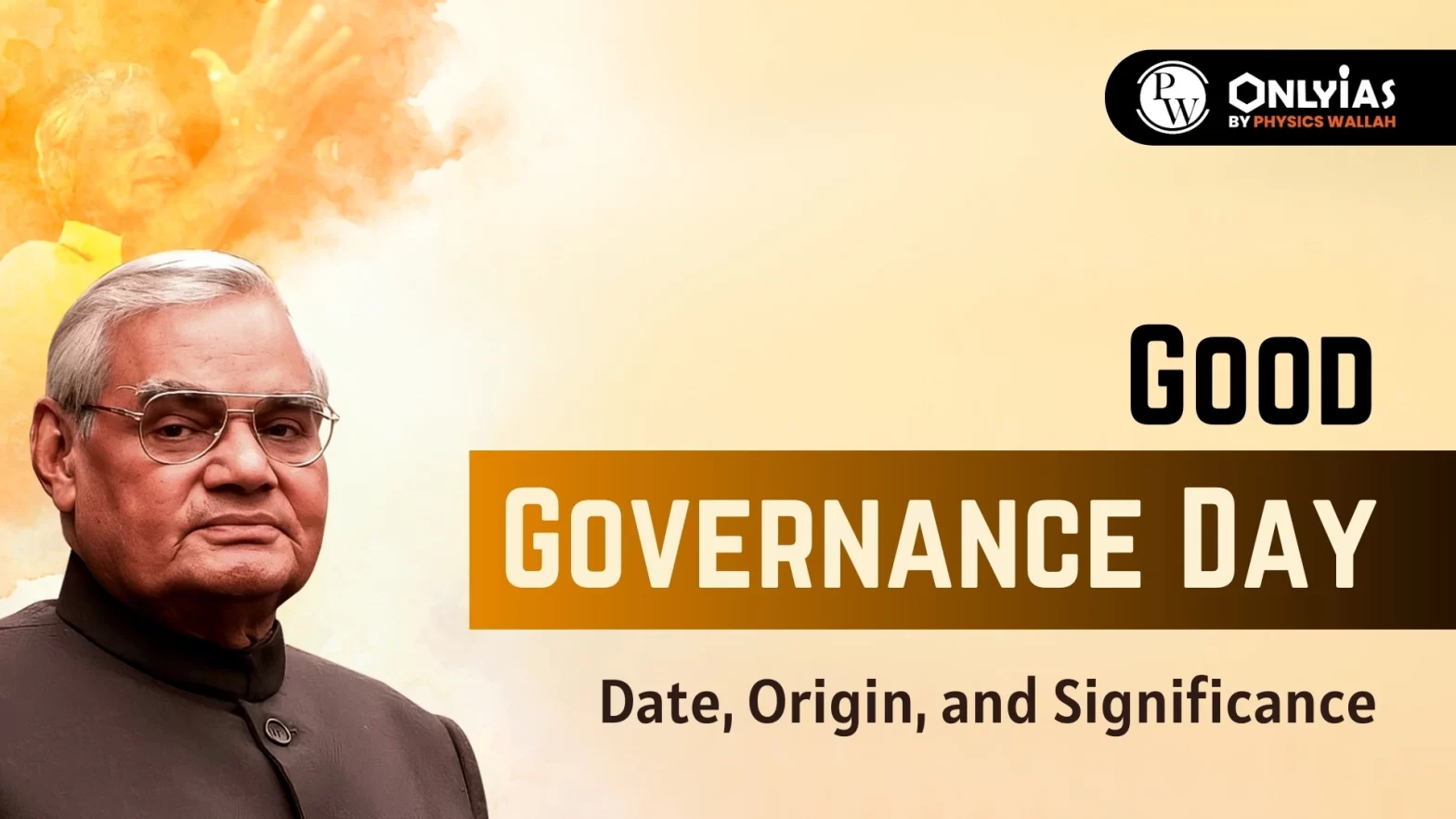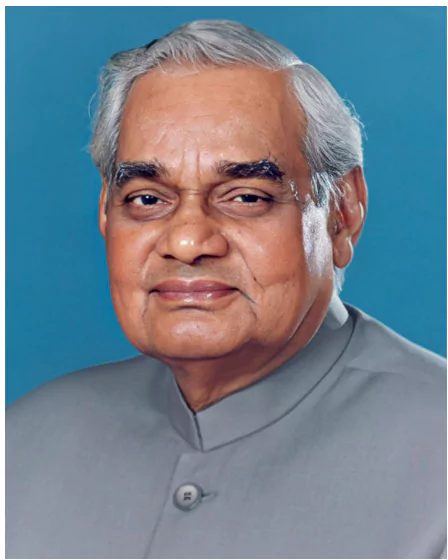Good Governance Day 2025 honors the birth anniversary of Atal Bihari Vajpayee, celebrating his visionary leadership, democratic values, and commitment to transparent, people-centric governance across India.

Good Governance Day observed annually in India on December 25th to honour the birth anniversary of Atal Bihari Vajpayee, the nation’s former Prime Minister. First celebrated in 2014, it underscores the government’s commitment to providing a transparent and accountable administration and ensuring that the benefits of development reach every citizen. Read more about Good Governance Day 2025, its history, and significance.
Atal Bihari Vajpayee’s birth anniversary on December 25 is celebrated as Good Governance Day since 2014, honoring his legacy of transparent and efficient administration during his tenure as Prime Minister. The day promotes principles like accountability, citizen-centric services, and rule of law through nationwide seminars, awards, and government programs. Institutions highlight e-governance, anti-corruption efforts, and sustainable policies inspired by Vajpayee’s vision of ‘Sabka Saath, Sabka Vikas’. Schools, offices, and NGOs participate in events emphasizing ethical leadership and public welfare for nation-building.
| Good Governance Day 2025 Overview | |
| Details | Information |
| Date | December 25, 2025 |
| Also Known As | Birth Anniversary of Atal Bihari Vajpayee |
| Significance | 101st Birth Anniversary of Atal Bihari Vajpayee |
| First Observance | 2014 |
| Campaign | Prashasan Gaon Ki Ore |
| Good Governance Week 2025 | December 19 to 24, 2025 |
| Purpose | Promote accountability, transparency, and citizen participation |
Atal Bihari Vajpayee’s birth anniversary falls on December 25, 2025, marking 101 years since the birth of India’s beloved former Prime Minister. Known for his poetry, leadership, and vision of a strong India, he served three terms and led key reforms like the Golden Quadrilateral highways. The day is celebrated as Good Governance Day with simple events in schools, offices, and villages to honor his honest work. People remember his simple life, unity speeches, and love for all Indians through speeches, drawings, and small programs.
Atal Bihari Vajpayee’s birth anniversary on December 25 is celebrated as Good Governance Day since 2014, honouring his legacy of transparent and efficient administration during his tenure as Prime Minister. The day promotes principles like accountability, citizen-centric services, and rule of law through nationwide seminars, awards, and government programs. Institutions highlight e-governance, anti-corruption efforts, and sustainable policies inspired by Vajpayee’s vision of ‘Sabka Saath, Sabka Vikas’. Schools, offices, and NGOs participate in events emphasising ethical leadership and public welfare for nation-building.
Good Governance Day serves as a reminder of the importance of transparent, accountable, and responsive governance to the needs of the people. Good governance is a process of managing public resources and institutions honestly and fairly, without corruption or misuse of power. It ensures that laws are followed, human rights are protected, and the needs of society are met.
It aims to foster awareness among the populace about the government’s responsibility to serve citizens effectively and to encourage public participation in the governance process. Good Governance Day is celebrated to:
Good GovernanceGovernance: It can be defined as the process of making and enforcing decisions within an organization or society. Governance is not just essential for maintaining order; it also helps in achieving objectives and addressing the needs of the community or group.
|
Good Governance Day emphasizes ethical governance, transparency, and citizen participation through various initiatives. These initiatives aim to make administration more efficient, accountable, and citizen-centric.

Atal Bihari Vajpayee was a prominent Indian politician and a founding member of the Bharatiya Janata Party (BJP). Known for his eloquence and poetic prowess, he was respected across party lines for his moderate political views and efforts to build consensus. Vajpayee’s political career spanned over five decades, during which he played a pivotal role in shaping India’s domestic and foreign policies. In recognition of his service to the nation, he was awarded the Bharat Ratna, India’s highest civilian honor, in 2015.
|
Biography of Atal Bihari Vajpayee |
|
| Full Name | Atal Bihari Vajpayee |
| Date of Birth | December 25, 1924 |
| Place of Birth | Gwalior, Madhya Pradesh (erstwhile princely state) |
| Political Party | Bharatiya Janata Party (BJP) |
| Prime Ministerial Terms |
|
| Parliament Member | Elected to Lok Sabha 9 times, Rajya Sabha 2 times |
| Key Roles | Prime Minister, Foreign Minister, Leader of Opposition, Chairperson of important Parliamentary Committees |
| Political Movement | Quit India Movement (1942), Nationalist politics through Bharatiya Jana Sangh |
| Recognition | Padma Vibhushan, Best Parliamentarian (1994), Bharat Ratna (2015), Order of Ouissam Alaouite (Morocco) |
| Achievements | Pokhran Nuclear Test, Kargil War, Golden Quadrilateral, Pradhan Mantri Gramin Sadak Yojana |
| Legacy | Birthday is observed as Good Governance Day |
The Good Governance Index (GGI) is an initiative of the Government of India to evaluate and compare the governance performance of states and union territories. It measures effectiveness in policy implementation, service delivery, and administrative efficiency across key sectors such as health, education, infrastructure, social welfare, and economic governance. The index promotes transparency, accountability, and healthy competition among states, helping policymakers identify best practices and areas for improvement to ensure inclusive and citizen-centric development.
Group A States
| Rank | State | Position |
|---|---|---|
| 1 | Gujarat | 1st |
| 2 | Maharashtra | 2nd |
| 3 | Goa | 3rd |
Group B States
| Rank | State | Position |
|---|---|---|
| 1 | Madhya Pradesh | 1st |
| 2 | Rajasthan | 2nd |
| 3 | Chhattisgarh | 3rd |
North-East & Hill States
| Rank | State | Position |
|---|---|---|
| 1 | Himachal Pradesh | 1st |
| 2 | Mizoram | 2nd |
Union Territories
| Rank | Union Territory | Position |
|---|---|---|
| 1 | Delhi | 1st |
| State / Union Territory |
|---|
| Tamil Nadu |
| Maharashtra |
| Himachal Pradesh |
| Puducherry |
Ready to boost your UPSC 2026 preparation? Join PW’s UPSC online courses today!
Check Out UPSC CSE Books
Visit PW Store
Good Governance Day is observed on December 25th every year to commemorate the birth anniversary of Atal Bihari Vajpayee and promote transparency and accountability in governance.
It is celebrated to honor Atal Bihari Vajpayee's contributions to Indian politics and to raise awareness about the importance of ethical governance and citizen participation.
Good Governance Day 2025 theme centers on "Prashasan Gaon Ki Ore" (Governance Towards Villages), emphasizing grassroots administration and rural empowerment.
Atal Bihari Vajpayee was a renowned Indian politician, former Prime Minister of India, a poet, and a founding member of the Bharatiya Janata Party (BJP).
The 2025 Good Governance Day is significant as it marks the 100th birth anniversary of Atal Bihari Vajpayee, with a special week-long campaign titled 'Prashasan Gaon Ki Ore' from December 19-24, 2025.
<div class="new-fform">
</div>